This article may contain affiliate links.
Updated: August 24, 2025
I tell you the most interesting curiosities about Greece about its customs, beliefs, ancient Greece, inventions, food and much more.
1. Country name
The word Greece comes from the name given to it by the Romans, Greece, which means the "land of the Greeks".
However, the official name of the country is Hellenic Republic and the Greeks use Hellas or Elláda as an abbreviation.
To pronounce it, keep in mind that the "h" is silent and the double "l" sounds as if it were a single "l."

2. Greek language
Greek is the oldest language still in use, it is believed that It was spoken in the third millennium BC, therefore, it would have more than 5,000 years.
As to Greek writing, the archaeological evidence is a little more recent. Some clay tablets were found that prove its use 3,400 years ago, which are not a few years.
This is the official language of Greece and Cyprus, which in ancient times had a great influence on other languages such as Latin, which is why in Spanish we have many words that come from Greek.
Some examples are scientific words or the names of some sciences such as geography or philosophy.
3. Patron Saint of Athens
Athena, the goddess of wisdom and war, She is the patron saint of the city of Athens.
According to Greek mythology, The dispute over who would have the patronage of Athens was between Poseidon and Athena, who held a contest with gifts to the inhabitants of the city.
Poseidon stuck his trident into a rock next to the Temple of Erechtheion on the Acropolis and a stream of seawater flowed from there.
Instead, Athena gave the city an olive tree as a gift which he planted as a symbol of prosperity and peace.
At first, the olive tree may seem like a too simple gift, but Cecrops, who was the first king of Athens and who had to decide, opted for Athena.
The reason is that the olive tree was more valuable, it gave them fruit, oil and wood.
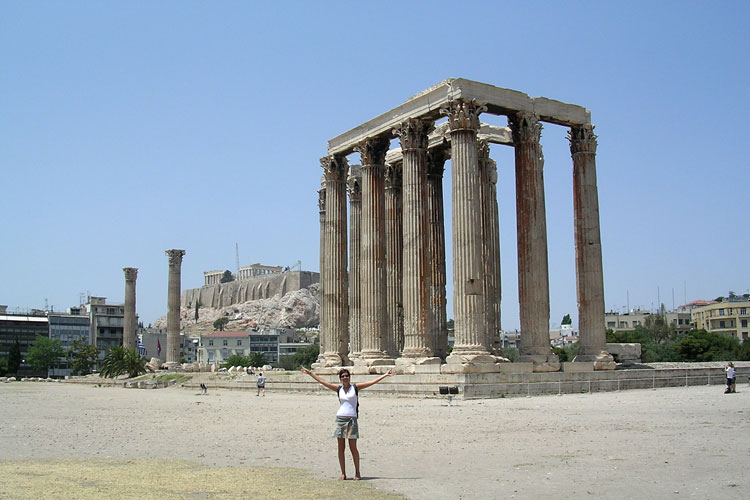
4. Olympic Games
This is one of the best-known curiosities of Greece, but I will tell you some details that may surprise you.
The Olympic Games are a Greek invention from the year 776 BC in the city of Olympia, 188 km from Athens, where the most important sanctuary of Zeus was located.
When it comes to the origin there are several stories, some include Heracles Ideo, a mythological healer who challenged his brothers to a race.
Other theories say that It was Zeus who created it after defeating Cronus in a tournament, this is one of the most accepted theories, due to the place of creation of the games.
The ancient Olympic Games were held every 4 years and were so important that all activities were compulsorily stopped and wars, so that people could enjoy this event.
The celebration in those times, in addition to sports tournaments, included offerings to the gods and sacrifices.
At the same time, it was an opportunity for the disadvantaged classes to compete on equal terms with the upper classes and even the nobility.
The Olympic Games They were exclusively for Greek citizens and were banned in the year 393 by the Roman emperor Theodosius I.
It was only 1,500 years later that what we know today as the modern Olympic Games were resumed.
5. Olives
Olives, although not of Greek origin, are of great importance, they were the Persians who introduced the first olive trees in the 16th century BC
In ancient times, the olive tree was associated with the gods and represented various virtues such as wisdom, strength and fertility.
Today, Greece is the fifth largest producer of olives in the world and is one of the countries with the most varieties, it is said that there are about 600 varieties.
If you are a person passionate about olives, be sure to try them on your trip to Greece, because the flavors and textures you will find are very different from those you could find in your country.
Some of the most popular are:
- Halkidiki They are green and large in size, known as "donkey olives", with a fruity, bitter and crunchy aroma.
- Kalamata It is the queen of black or purple olives, it is a classic in salads and appetizers.
- Koroneiki They are famous very small green olives from Crete, their oil is considered one of the best in the world.
6. Olive oil
Olive oil has been linked to the history of Greece since ancient times, The oldest olive oil amphorae are from 3500 BC
Furthermore, this oil was highly valued and had many uses.
In the ancient Olympic Games, the winners, In addition to the crown of olive trees, They received amphorae full of this precious oil.
Olive oil too served to light the "eternal flame" of the Olympic torch.
They also had various uses such as medicines, sun protection and even anointed the bodies of the deceased in olive oil.
7. Feta cheese
Feta cheese is the cheese par excellence of Greece.
Name feta It refers to the cutting of cheese into slices or slices and the first records of its use were during the Byzantine Empire in a poem by the doctor Avicenna.
However, this cheese was made much earlier in Greece, it simply did not have a name, it was simply called cheese and is described for the first time in the Homer's Odyssey of the 8th century BC
The traditional feta cheese is from sheep, but it may contain 30 % of goat's milk or be made from other milks.
In 2002, the European Union gave feta the recognition it deserved, with a Protected Designation of Origin, and now Authentic feta cheese can only be made in 7 regions of Greece.
You can enjoy this delicious cheese alone or in dishes, such as the famous Greek salad that has a good whole block of this cheese.

8. Greek inventions
The ancient Greeks contributed enormously when it came to architecture, medicine, engineering, astronomy and other sciences.
Furthermore, they were the inventors of Western civilization with its democracy, literature, drama, philosophy, western logic, political science and many more.
9. Cheesecake
Although this invention is not as important as democracy or philosophy, I am immensely grateful to them. 💘
The Greeks were the inventors of the first cheesecake or cheesecake.
Specifically, it was the Greek physicist Égimus from the 5th century BC, who wrote a book on the art of making cheesecakes.
10. Coffee Frappe
If you like coffee and you travel to Greece in summer, you cannot miss trying a delicious and refreshing frappé coffee, a completely accidental Greek invention.
This unique cold coffee is served with ice and with an exquisite foam or in the more modern versions with cream.
The origin was in the Thessaloniki International Fair in 1957, when Dimitris Vakondios couldn't find hot water to make coffee and decided to make it with cold water.
Since the coffee was instant, it did not dissolve well in water and he used a shaker, resulting in this wonderful coffee.
Another curiosity about this coffee is that when it is prepared in Greece, it is already sweetened for you, you can choose:
- Glikós = sweet, they add 4 teaspoons of sugar.
- Metrics = medium, has 2 teaspoons of sugar.
- Sketos = bitter, without sugar.
👍 Tip: In the past, frappé coffee was the only fresh option to have a coffee in Greece, now you can find more modern alternatives such as Freddo Cappuccino and Freddo Espresso on the menus. Although he Café Frappé is a classic.
11. Plumbing and Sanitation
Another of the most amazing curiosities about Greece is that the Minoan civilization of 5th century BC were the first to use underground pipes that were made of clay that served to provide water and sanitation.
Traces of plumbing systems for bathrooms, fountains and personal uses have been found in excavations at Olympus and in Athens.

12. Vending machine
The Greeks too they invented vending machines.
I think this is one of the most fascinating curiosities about Greece, not for the fact of inventing it because it shows that they were very ahead of their time. If not for what sold holy water.
It worked just like vending machines today, you put in a coin and the machine let out a little of the precious holy water.
The first record of this machine is from the 1st century BC by Heron of Alexandria, a Greek engineer.
👍 Tip: If you like to know the history of inventions, I suggest you look for more information about Heron of Alexandria who invented many more things such as: automatic doors and air and water pumps, these bombs were used to invent fountains and fire hoses.
13. Yo-yo
The origin of the popular yo-yo is unknown, but it is thought that it could have been in ancient Greece, who were inspired by the Chinese game, diabolo.
At least the first official record of a yo-yo is on a pottery from 440 BC. Greek, where a child is seen playing with one.
14. Prohibited heels
Right off the bat it can be a very confusing curious fact about Greece. 😅
In 2009 Greece banned high heels at archaeological sites, specifically shoes that have thin heels because they damage the local stones.
It really makes a lot of sense, because even what we are stepping on is part of the history of the place and it is normal that they protect it.
Surely, during the day it is rare for someone to wear thin-heeled shoes, which is why the measure includes events that take place at night in these places.
15. Sea sponges
Greece is the world's leading producer of marine sponges.
If you visit Greece you will find shops selling sponges everywhere, a personal hygiene item that It was already used in Plato's time, especially by the upper class.
The collection of sea sponges is very linked to the history and traditions of Kalymnos, a Dodecanese island near the Greek island of Kos and Bodrum in Turkey.
The diving industry to extract these sponges made this island, which is sometimes called “sponge island«.
16. Sunny days
Greece is the country with most sunny days in the entire Mediterranean, with an average of 250 sunny days, for a reason it is one of the main summer destinations.
If you visit the Greek islands in summer, it is difficult to see any clouds and even less rain.
17. Mountainous country
When we think of Greece, the first thing that comes to mind is its fabulous history or its beautiful Greek islands.
What if I told you that Greece is the most mountainous country in all of Europe.? This is one of the most impressive curious facts about Greece, because its mountains are not the highest.
However, an 80% of the country is covered with mountains or hills.
This country has 18 peaks that exceed 2,200 m in height, with Mount Olympus at the top of the list at 2,904 m.
18. Extensive coastline
If you love going to the beach, Greece has beaches for all tastes with its 16,000 km coastline, of which 7,500 km are distributed among its more than 6,000 islands.
Although of all these islands only 227 are inhabited, finding deserted beaches in Greece is quite easy.
19. Near the beach
As Greece has so many coastlines on its winding continental contour and islands, beaches are always within walking distance.
In fact, The furthest you can be from the coast in Greece is 137 km. Not bad, huh?!

20. World Heritage Sites
It is nothing new about the great history of this beautiful country that keeps nothing less than 18 World Heritage Sites.
Many of them include archaeological sites built during Ancient Greece and other periods such as the Middle Ages or the Byzantine Empire.
Some of the most notable are: the Acropolis of Athens, Delphi, Mycenae, Olympia, Epidauros, the medieval city of Rhodes and Meteora.

21. Archaeological museums
Greece is the country in the world with the most archaeological museums, with a total of 110 museums covering different periods, from ancient Greece and the Byzantine era.
Some of the most notable are the Acropolis of Athens, National Archaeological Museum of Athens and those found in Delphi and Olympia.
22. One of the 7 Wonders of the ancient World
One of the 7 Wonders of the ancient World was in Greece, specifically on the island of Rhodes, it was the Colossus of Rhodes.
According to the main theory, the oldest port in Rhodes was at the entrance to the port of Mandraki.
The Colossus was a 32 m high statue of the sun god Helios, which stood on a 15 m marble pedestal, built in 292 BC, but 66 years later an earthquake destroyed it.

⭐ In this article you can read more about What to see in Rhodes: 27 essentials.
23. White houses with blue roofs
If you have seen photos of the Greek islands, you will surely have noticed the typical houses painted white with their blue roofs. Some say it is because of the colors of the flag or because of superstition.
However, the origin was due to a practical issue when building on the Greek islands.
The construction of houses was done with the rocks available in the area, which They were of volcanic origin.
One of the properties of volcanic stones is their insulating power, but during the Greek summers of intense sun, the dark color of the rocks made the homes too hot.
Hence they began to paint them with lime, which is the cheapest way, and at the same time white reflects light keeping the interior of the houses cool.
The ceilings could have been painted any color, the reason it is blue is because it was accessible and cheap. The lime was dyed with a Popular cleaning agent in Greece known as loulaki what is blue.
Subsequently, a mandate came from the military government in 1967 that forced houses to be painted that color and then by a law from the Greek government in 1974; However, the tradition had been around for a long time.
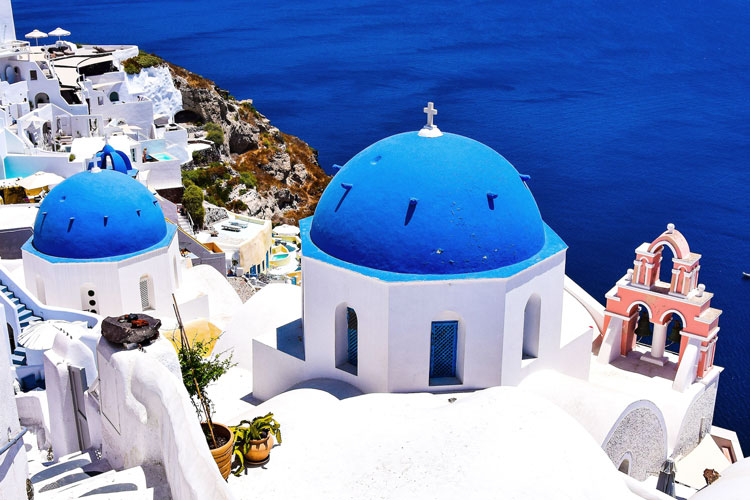
24. More theaters
Athens is the city with the most theaters in the world, with a total of 148 stages, a number that surpasses Broadway in New York and the West End neighborhood in London.
But it's normal, after all it was the Greeks who invented theater and drama.
If you want to go to a theater during your visit to Athens, I recommend the Odeon, which is at the foot of the Acropolis and was built in the year 161.
There you can see operas or concerts of classical or modern music.
Can you imagine being in this ancient Greek theater listening to a rock concert? Well, it's possible! 🤟

25. Traditional dances
Greek dance is one of the oldest arts in the country that was already mentioned by Plato and Aristotle.
In total there are more than 10,000 types of traditional Greek dances with choreographies and movements that vary from one region to another.
Dance in Greece has a social function and is always present at saints' festivals, during the grape harvest, Holy Week, weddings, baptisms and any other important community event.
The most famous dance is the Sirtaki who became internationally known thanks to the film Zorba the Greek with Anthony Quinn as the protagonist.
It is a very fun dance that is danced by placing your arm on your neighbor's shoulder, in a line or circle and alternating fast and slow steps.
In this video below you can see a scene from the movie Zorba the Greek. If you continue watching the playlist, there is a video of a professional performance of the dance and another of breaking plates, a tradition I tell you about below.
26. Celebration of the Saint
In Greece, the celebration of the Saint, which corresponds to each person's name, It is more common and important than celebrating a birthday.
Furthermore, it is very common for Greek people to be named after a saint.
27. Evil eye
The Greeks are a very superstitious people and the evil eye or manti, is the most widespread superstition.
The manti is an evil caused by a person who looks with jealousy or envy and can cause discomfort, illness or even death.
The talisman to protect against the evil eye, it is the Nazar, which is made of glass and represents a blue eye, because it is believed that blue-eyed people are the most prone to giving the evil eye.
Therefore, you will find these eyes in many Greek stores and they can be an eye-catching souvenir to give as a gift.

28. Breaking plates
One of the most peculiar Greek traditions is that of breaking plates in very diverse celebrations such as saying goodbye to the deceased or celebrating a wedding.
The act of breaking dishes meant as to mark the end or beginning of something, to drive away evil spirits and abundance.
As festive people as the Greeks are, the tradition of breaking plates is accompanied by live music and dance, and they often repeat themselves quite a bit. the word "Opa".
This tradition is an experience to live, if you are going to go to Santorini, you can go to this Greek Wedding show which includes dancing and many broken dishes. 💃
29. Komboloi, a hobby
The komboloi is one of the most curious Greek customs that attracts the attention of travelers when they see the grandparents playing with a komboloi in their hands.
The komboloi has its origins in the monks of Mount Athos who made beaded necklaces by tying knots after each bead, to count the prayers prayed to their God, like a rosary.
In fact, the word komboloi is composed of kombos and loggia, What do they mean “at every knot, I say a prayer”.
However, now the use is to relax the mind and soul, it no longer has a religious purpose, but rather a simple pastime for grandparents.
Historically, the beads have been made of different materials, such as wood, bone, amber or olive stones and with an odd number, there were originally 33 beads.
But since that number has a strong religious symbology, now the most common komboloi has 23 beads.
30. Number 5 with hand
In Greece, if you are talking to someone in Greece, be careful not to make the 5 sign with your hand.
Open palm with fingers spread it is an insult in this Mediterranean country, known as mundsa.
The origin dates back to the Byzantine Empire, when for a minor crime the judge found the accused guilty, put his hands in charcoal to get dirty and marked the guilty person's face. Thus, the mark was a kind of humiliation that everyone could see.
Nowadays is a way to show contempt towards the other person and it is stronger the closer the hand is to the face.
Therefore, if you want to show the number five with your hand, put your fingers together or better yet, turn your palm towards you.
31. Give thanks
One of the interesting facts about Greece is the gesture used to say thank you and it is a very common gesture.
It is about Put your right hand on the chest, where the heart is, and you can do two or three pats.
By the way, the way to say thank you in Greek is with the word efharisto, which is pronounced as if the "h" were a "j."
You can also say thank you very much, efharisto cop.
32. Delicious
Another of the curiosities of Greece that attracts attention is the way of saying with a gesture that something is delicious.
To do this you have to Place your palm facing up, join your fingers and move your hand slightly up and down.
Surely, the description has sounded familiar to you, because it is exactly the same as the very popular Italian gesture to say "what do you do/say?"
Final Thoughts
These are some of the best curiosities of Greece, a fascinating country that you will fall in love with, for a reason it is a destination that many travelers repeat.
Which of these curious facts surprised you the most? If you found the article useful, Share it with other curious travelers. 👍
More about Greece

Hi, I’m Andrea, creator and author of Viajeros Activos (Active Travelers). I write about Southeast Asia, the Caucasus, and Europe. I’m a full-time traveler, passionate about good food, and always looking for new adventures.



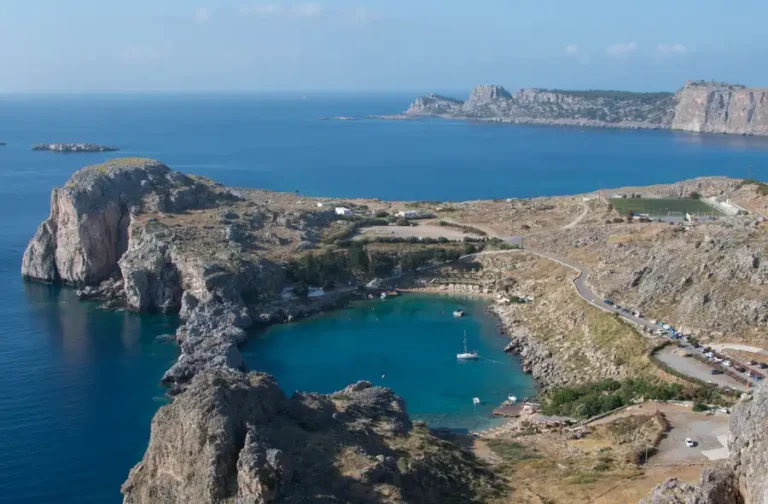
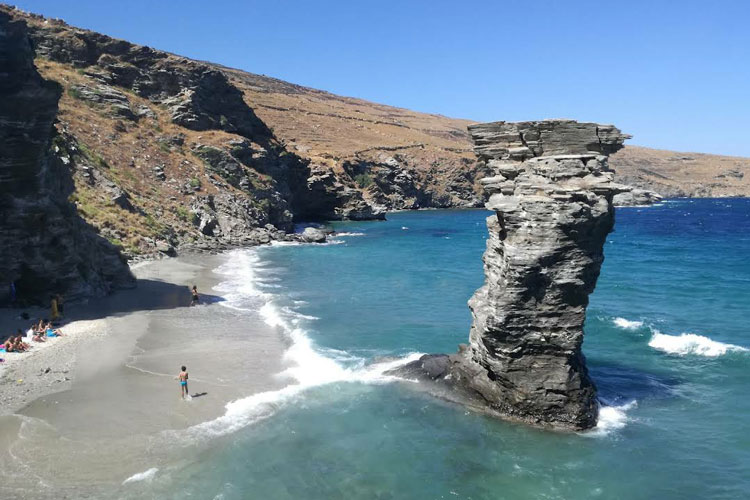

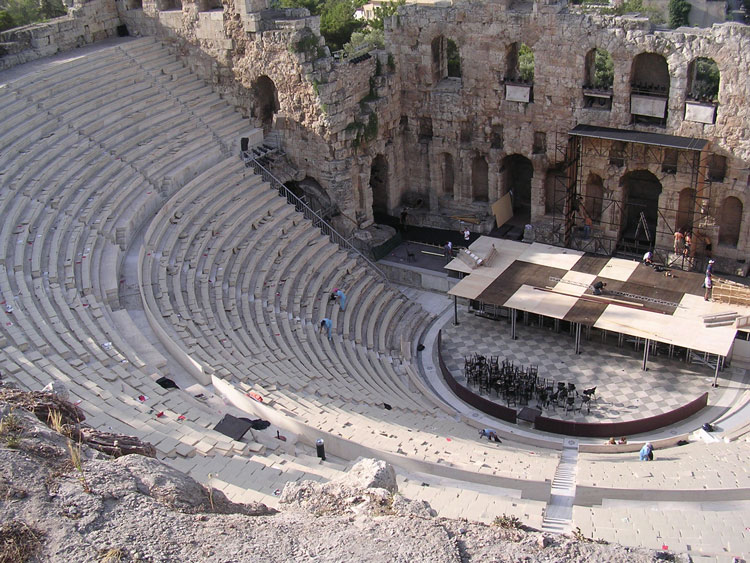
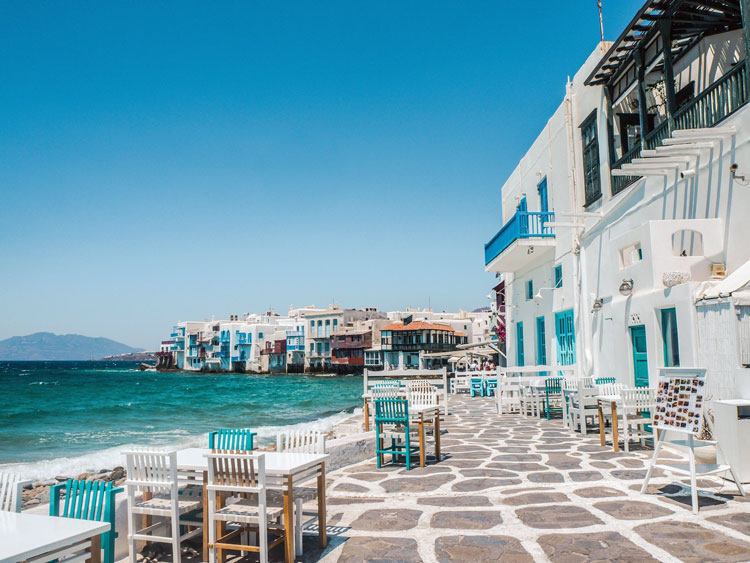
Hello: Please send me information about the 8-day Athens-Santorini-Mykonos Circuit.
Hello Jaime Jesus
This is a travel blog, I do not sell travel circuits.
Here I leave you the link to an article about Best all-inclusive trips to Greece There you can find a circuit that interests you.
Have a good trip!